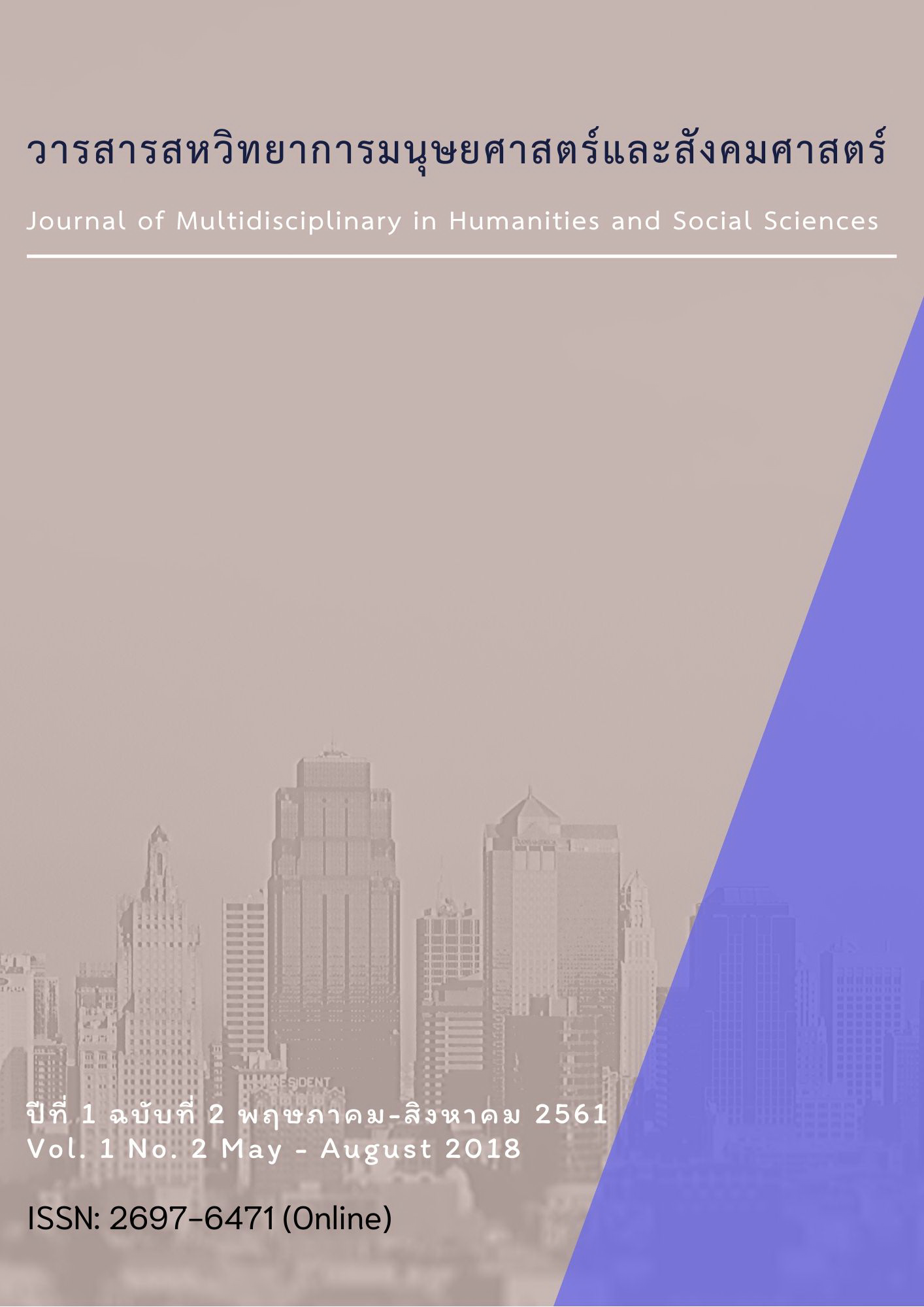การเสริมสร้างครอบครัวเข้มแข็งตามหลักเศรษฐกิจพอเพียงในชุมชน
Main Article Content
บทคัดย่อ
การวิจัยในครั้งนี้มีวัตถุประสงค์เพื่อ เพื่อแสวงหาแนวทางตามหลักเศรษฐกิจพอเพียงในการการเสริมสร้างครอบครัวเข้มแข็งสำหรับการพึ่งพาตนเองในชุมชน รูปแบบการวิจัยผสานวิธี เชิงปริมาณ เครื่องมือเป็นแบบสอบถาม จำนวน 400 ชุด ตรวจเครื่องมือตามหลักเกณฑ์ โดยกลุ่มตัวอย่างได้แก่ตัวแทนครอบครัว ในเขตความรับผิดชอบของสำนักงานส่งเสริมและสนับสนุนวิชาการ 8 จำนวน 8 จังหวัด ใช้การวิเคราะห์ข้อมูลโดยค่าร้อยละ ค่าเฉลี่ย ส่วนเบี่ยงเบนมาตรฐาน และ สถิติ Correlation (r) เชิงคุณภาพ เครื่องมือเป็นแบบสัมภาษณ์ กลุ่มผู้ให้ข้อมูลคนสำคัญ โดยวิธีเลือกแบบเจาะจง จากนักวิชาการ ปราชญ์ชาวบ้าน ผู้ที่ขับเคลื่อนงานด้านครอบครัว ผู้ที่ขับเคลื่อนงานตามหลักเศรษฐกิจพอเพียงเกี่ยวข้องในเขตพื้นที่รับผิดชอบของสำนักงานส่งเสริมและสนับสนุนวิชาการ 8 (สสว. 8) รวมจำนวน 20 คน ผลการวิจัยพบว่า หลักเศรษฐกิจพอเพียง (พอประมาณ ความมีเหตุผล มีภูมิคุ้มกัน) ในด้าน ความรู้และ มีความสัมพันธ์กับ ค่าความสัมพันธ์ในภาพรวม R=.797 มีความสัมพันธ์กันในเชิงบวก ร้อยละ 79.7 เป็นความสัมพันธ์ในระดับสูง แนวทางตามหลักเศรษฐกิจพอเพียงในการการเสริมสร้างครอบครัวเข้มแข็งสำหรับการพึ่งพาตนเองในชุมชน ซึ่งต้องเริ่มจาการศึกษา เรียนรู้ เพื่อให้มีความรู้เชิงลึก บนฐานของคุณธรรมตามมรรค 8 (ความเห็นที่ถูกต้อง ความคิดที่ถูกต้อง เจรจาที่ถูกต้อง การปฏิบัติที่ถูกต้อง การหาเลี้ยงชีพที่ถูกต้อง ความเพียรที่ถูกต้อง การมีสติที่ถูกต้อง การมีสมาธิที่ถูกต้อง) ลงมือปฏิบัติตามความรู้และคุณธรรมศึกษาจนเกิดความพอประมาณในตนเองและครอบครัวอย่างมีเหตุผลจากการปรับประยุกต์ใช้ในชีวิตประจำวันโดยมีการวางแผน
Article Details
ทัศนะและความคิดเห็นที่ปรากฏในวารสาร ถือเป็นความรับผิดชอบของผู้เขียนบทความนั้น และไม่ถือเป็นทัศนะและความรับผิดชอบของกองบรรณาธิการ
เอกสารอ้างอิง
รัฐพงศ์ บุญญานุวัตร(2554)การนำแนวคิดปรัชญาเศรษฐกิจพอเพียงมาใช้ในการด าเนินชีวิตของประชาชนในชุมชนเขตดุสิต กรุงเทพมหานคร. สถาบันวิจัยและพัฒนา,มหาวิทยาลัยราชภัฏสวนสุนันทา
นโยบายและยุทธศาสตร์การพัฒนาสถาบันครอบครัว พ.ศ. 2560 – 2564
นิธิ เอียวศรีวงศ์. (2544). มิติทางวัฒนธรรมในยุคเศรษฐกิจพอเพียง. กรุงเทพฯ: ศูนย์มานุษยวิทยา-สิรินทร.
ประเวศ วะสี. (2541). ประชาคมตำบล ยุทธศาสตร์เพื่อเศรษฐกิจพอเพียง ศีลธรรมและสุขภาพ.
กรุงเทพฯ : มติชน.
สมศักดิ์ ตรงงาม. (2553). การนำหลักปรัชญาเศรษฐกิจพอเพียงไปใช้ในการดำเนินชีวิตของประชาชน
ในอำเภอลาดหลุมแก้ว จังหวัดปทุมธานี. ภาคนิพนธ์รัฐประศาสนศาสตรมหาบัณฑิต, มหาวิทยาลัยราชภัฏสวนสุนันทา.
ผู้ให้สัมภาษณ์
จักรภฤต บรรเจิดกิจ. (2560, 11 กุมภาพันธ์). ปราชญ์เกษตรดีเด่น. ประธานศูนย์เรียนรู้กสิกรรมธรรมชาติเพื่อขับเคลื่อนปรัชญาเศรษฐกิจพอเพียงจังหวัดพิจิตร. พิจิตร. สัมภาษณ์เชิงลึก.
จรัล เหลืองศรีสกุล. (2560,9กุมภาพันธ์). นักพัฒนาสังคมชำนาญการพิเศษ. สำนักงานพัฒนาสังคมและความมั่นคงของมนุษย์จังหวัดพิจิตร.พิจิตร. สัมภาษณ์เชิงลึก.
เฉลียว บุรีภักดี. (2560,6กุมภาพันธ์). ประธานหลักสูตรศิลปศาสตรมหาบัณฑิต. มหาวิทยาลัย ราชภัฎเพชรบุรี. เพชรบุรี. สัมภาษณ์เชิงลึก.
ธนพล ศรีใส. (2560,8กุมภาพันธ์). ประธานศูนย์เกษตรทฤษฎีใหม่. ศูนย์เกษตรทฤษฎีใหม่ตำบลหัวป่า. สิงห์บุรี. สัมภาษณ์เชิงลึก.
บุญมี เรเรือง. (2560,11กุมภาพันธ์). วิทยากรศูนย์เรียนรู้กสิกรรมธรรมชาติเพื่อขับเคลื่อนปรัชญาเศรษฐกิจพอเพียงตำบลสายคำโห้. พิจิตร. สัมภาษณ์เชิงลึก.
ประสิทธิ์ ณ นคร. (2560,10กุมภาพันธ์). ประธานสภาองค์การบริหารส่วนตำบลคลองน้ำไหล. กำแพงเพชร. สัมภาษณ์เชิงลึก.
ปวีณา จันทร์เดช. (2560,7กุมภาพันธ์). นักพัฒนาสังคมชำนาญการ. กรุงเทพฯ. สัมภาษณ์เชิงลึก.
ศักดิ์ชัย สัมทับ และ ตฤณศร สัมทับ. (2560,12กุมภาพันธ์). ปราชญ์ชาวบ้าน. กำแพงเพชร. สัมภาษณ์เชิงลึก.


